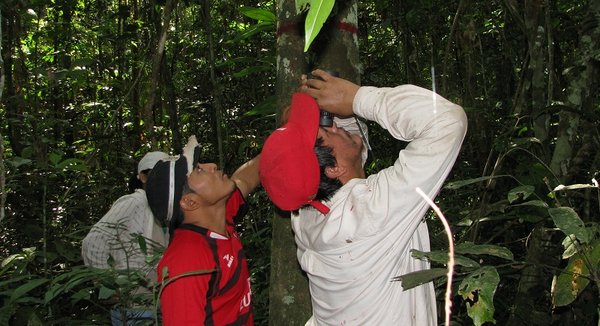 Read this article in French
Read this article in French- Share this article
- Subscribe to our newsletter
Tropical forests’ carbon sink 'already rapidly weakening'
A global scientific collaboration led by the University of Leeds, United Kingdom, reveals that a feared switch of the world’s undisturbed tropical forests from a carbon sink to a carbon source has begun. Climate models typically predict that this tropical forest carbon sink will continue for decades.
However a new analysis of three decades of tree growth and death from 565 undisturbed tropical forests across Africa and the Amazon has found that the overall uptake of carbon into Earth’s intact tropical forests peaked in the 1990s.
By the 2010s, on average, the ability of a tropical forest to absorb carbon had dropped by one-third. The switch is largely driven by carbon losses from trees dying.
The study by almost 100 institutions, which was published in the international magazine Nature in March this year, provides the first large-scale evidence that carbon uptake by the world’s tropical forests has already started a worrying downward trend.
Study lead author Dr Wannes Hubau, a former post-doctoral researcher at Leeds now based at the Royal Museum for Central Africa in Belgium, says: “We show that peak carbon uptake into intact tropical forests occurred in the 1990s.” Combining data from Africa and the Amazon revealed why these forests were changing, with carbon dioxide levels, temperature, drought and forest dynamics being key.
“Extra carbon dioxide boosts tree growth, but every year this effect is being
increasingly countered by the negative impacts of higher temperatures and droughts which slow growth and can kill trees,” the scientist explains. “Our modelling of these factors shows a long-term future decline in the African sink and that the Amazonian sink will continue to rapidly weaken, which we predict to become a carbon source in the mid-2030s.”
A worrying downward trend
In the 1990s, intact tropical forests removed roughly 46 billion tonnes of carbon dioxide from the atmosphere, declining to an estimated 25 billion tonnes in the 2010s.The lost sink capacity in the 2010s compared to the 1990s is 21 billion tonnes carbon dioxide, equivalent to a decade of fossil fuel emissions from the UK, Germany, France and Canada combined.
Overall, intact tropical forests removed 17 per cent of human-made carbon dioxide emissions in the 1990s, which dropped to just 6 per cent in the 2010s. This decline is because these forests were 33 per cent less able to absorb carbon by and the area of intact forest had declined by 19 per cent, while global carbon dioxide emissions had soared by 46 per cent.
Senior author Professor Simon Lewis, from the School of Geography at Leeds, says: “Intact tropical forests remain a vital carbon sink, but this research reveals that unless policies are put in place to stabilise Earth’s climate it is only a matter of time until they are no longer able to sequester carbon. After years of work deep in the Congo and Amazon rainforests we’ve found that one of the most worrying impacts of climate change has already begun.”
Differences between the Amazon and the African forests
According to the study, the continental difference arises from a combination of Amazon forests being more dynamic than those in Africa and Amazon forests facing stronger climate impacts. Typical Amazonian forests are exposed to higher temperatures, faster temperature increases and more regular and severe droughts than African forests.
The authors also highlight that tropical forests are still huge reservoirs of carbon, storing 250 billion tonnes of carbon in their trees alone. This storage is equivalent to 90 years of global fossil fuel emissions at today’s level.
Study author Professor Bonaventure Sonké, from the University of Yaoundé I in Cameroon, said: “The speed and magnitude of change in these forests suggests that climate impacts in the tropics may become more severe than predicted. African countries and the international community will need to seriously invest in preparation for on-going climate change impacts in tropical regions.”
Professor Lee White, Gabon’s Minister for Water, Forests, the Sea and Environment, said: “This study highlights the importance of the Congo Basin forests, which despite covering only one third of the area of the Amazon now absorb almost as much CO2 annually. The African carbon sink is proving to be more resilient to climate change, perhaps because Africa’s forests have been more severely impacted by climate stress in the past."
(University of Leeds/wi)
Reference:
Wannes Hubau, Simon L. Lewis et al.: Asynchronous carbon sink saturation in African and Amazonian tropical forests, Nature, 579, pp. 80-87, March 2020





Add a comment
Be the First to Comment